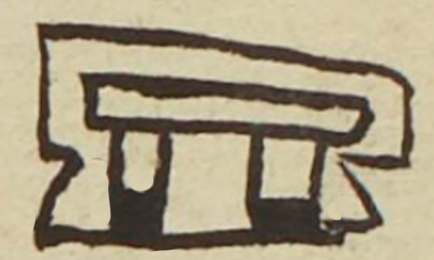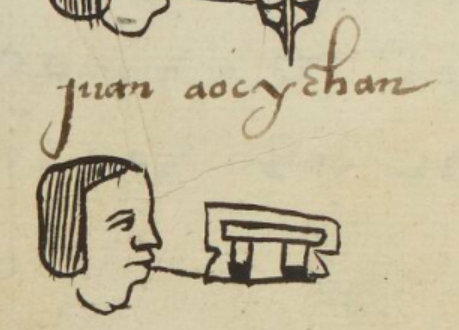Aoc Ichan (MH533r)
This black-line drawing of the simplex glyph for the personal name Aoc Ichan (“No Longer His Home,” attested here as a man’s name) shows a house in a frontal view. The gloss explains that it is a former home (chantli) pertaining to someone, if not the tribute payer himself. In society today, this could evoke "Homeless." The chantli is just like a calli; there is no visual difference between the two. This building shows an entryway framed by significant beams, probably made of wood. The bottoms of the two upright beams are painted black.
Stephanie Wood
The use of the adverb aoc across this digital collection is something worthy of close study. Adverbs are somewhat rare, and this negative one might be useful for studying changes in daily life that could be related to emotion. See, for example, Aoc Tocniuh, below. An empty house conjures up the loss of life from epidemics in the colonial context, but if this name predates European colonization, it could simply refer to a house that was abandoned through natural death. This is also worth pursuing for a greater understanding of naming practices. Why would parents give a name such as this to a baby? Was it a metaphor for an orphan, a wanderer/vagrant, a vacant mind, or the like?
Stephanie Wood
juan aocychan
Juan Aoc Ichan
Stephanie Wood
1560
Jeff Haskett-Wood
homeless, sin hogar, aoquichan

aoc, no longer, https://nahuatl.wired-humanities.org/content/aoc
chan(tli), home, https://nahuatl.wired-humanities.org/content/chantli
i- (possessive pronoun), third person singular, https://nahuatl.wired-humanities.org/content/i
"Ya No Es Su Hogar"
Matrícula de Huexotzinco, folio 532v, https://www.loc.gov/resource/gdcwdl.wdl_15282/?sp=144&st=image
This manuscript is hosted by the Library of Congress and the World Digital Library; used here with the Creative Commons, “Attribution-NonCommercial-ShareAlike 3.0 License” (CC-BY-NC-SAq 3.0).







